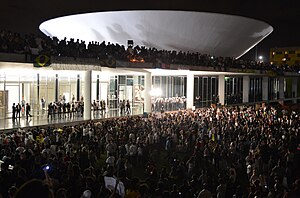2013 Brazilian protests
| June Jorneys | |||
|---|---|---|---|

Protesters at the National Congress of Brazil, in Brasília, June 17
|
|||
| Date | April – July 2013 | ||
| Location | • Over 100 Brazilian cities and cities with Brazilian diasporas around the globe | ||
| Caused by | • Increases in bus, train and metro fare in some major cities • Multiple issues regarding infrastructure, education and health care among other public services • High cost of living • Increasing government funding of major sports events • Feeling of alienation from government decisions • Multiple scandals of corruption, embezzlement and overbilling in the government • Multiple reports of abuse of special benefits conceded to Brazilian politicians • Controversial law in discussion by National Chamber's plans limiting the powers of the Public Ministry to investigate criminal activities, among other reasons |
||
| Goals | • Improvements in public transport with less cost to the population (subdued June 24) • Increase of government effort and funds to improve other key services including public education, national health care and transport infrastructure altogether (subdued June 24) • Less priority to fund major sports events (subdued June 24) • Revocation of controversial law in discussion by National Chamber's plans limiting the powers of the Public Ministry to investigate criminal activities in the government (subdued June 25) |
||
| Methods | Demonstrations, protest marches, online activism, strike action | ||
| Status | Major protests subsided | ||
| Number | |||
|
|||
| Casualties | |||
| Death(s) | 4+ | ||
| Injuries | 100 | ||
| Arrested | 250 | ||
The 2013 protests in Brazil, or 2013 Confederations Cup riots, also known as the V for Vinegar Movement,Brazilian Spring, or June Journeys, were public demonstrations in several Brazilian cities, initiated mainly by the Movimento Passe Livre (Free Fare Movement), a local entity that advocates for free public transportation.
The demonstrations were initially organized to protest against increases in bus, train, and metro ticket prices in some Brazilian cities, but grew to include other issues such as the high corruption in the government and police brutality used against some demonstrators. By mid-June, the movement had grown to become Brazil's largest since the 1992 protests against former President Fernando Collor de Mello.
As with the 2013 Gezi Park protests in Turkey, social media has played an important role in the organization of public outcries and in keeping protesters in touch with one another.
Urban riots in Brazil have been traditionally been referred to as the 'Revolt of [Something]'. An example of this was Rio de Janeiro's Revolta da Vacina in the early 20th century. These particular protests have been referred to as the Revolta da Salada ([ʁɛˈvɔwtɐ da saˈladɐ]), Revolta do Vinagre ([ʁɛˈvɔwtɐ du viˈnagɾi]) or Movimento V de Vinagre ([moviˈmẽtu ˈve dʒi viˈnagɾi]) after more than 60 protesters were arrested in June 2013 for carrying vinegar as a home remedy against the tear gas and pepper spray used by police.
...
Wikipedia
